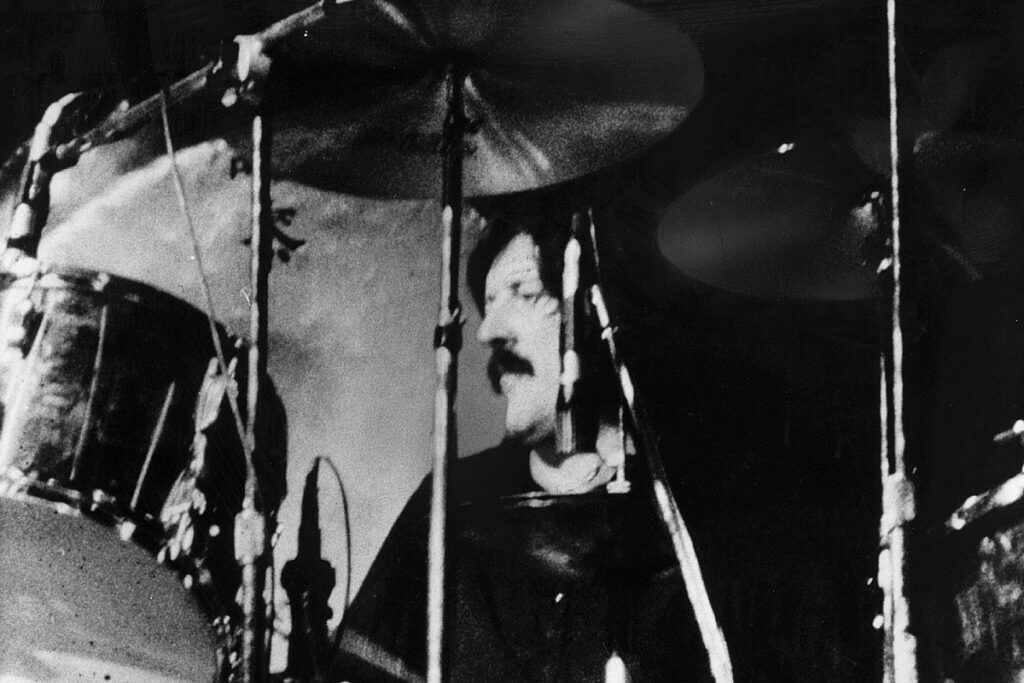
43 Years Ago – Led Zeppelin Drummer John Bonham Dies
The thunderous backbone to Led Zeppelin’s sound went silent when John Bonham was found dead Sept. 25, 1980, effectively ending the band as an active unit.
The drummer had consumed an estimated 40 shots of vodka the day and night prior at rehearsals for the band’s upcoming North American tour which was announced exactly two weeks earlier and scheduled to kick off less than a month later. Put to bed just after midnight at guitarist Jimmy Page‘s house in the south England town of Windsor, Bonham would be found lifeless the next afternoon by sound engineer Benji LeFevre and bassist John Paul Jones.
“It was like, ‘Let’s go up and look at Bonzo, see how he is,’” Jones said. “We tried to wake him up … it was terrible. Then I had to tell the other two … I had to break the news to Jimmy and Robert [Plant].”
Police arrived at Page’s residence but ruled out any suspicious circumstances – it was just an unfortunate mishap. The coroner would later issue the inquiry verdict that the death was accidental due to “consumption of alcohol.”
To say the loss of Bonham was monumental puts it in perhaps the best terminology. The 32-year-old had been an integral part of the band’s sound from day one; he was hardly just back behind the kit holding down the beat. Take a listen to the booming attack he delivers on “Achilles’ Last Stand,” the near-funk groove on “Trampled Underfoot” or the rollicking crash and bang of “South Bound Suarez.” It wasn’t all aggressive either; Bonham could just as easily deliver a lighter touch like on the restrained “The Rain Song” or the gorgeously wistful “Down by the Seaside.”
Led Zeppelin, “Achilles’ Last Stand” — Live in 1977
“The passing of John Bonham…let’s just put it…before we say, ‘the passing of John Bonham,’ the introduction of John Bonham on the first album and “Good Times Bad Times,” it changes drumming overnight,” Page said in 2015. “So that’s in 1968. And we’re talking about 1980. It’s 12 years of John Bonham’s musical input being appreciated by the whole world of music in every way — the fact that it changes drumming, the fact that it changes people’s appreciation of drums and music.
Page then said Bonham’s death was, “a massive loss to everybody. Everybody had been touched by John Bonham’s music.”
The drummer certainly influenced legions of players both past and present, with anyone who took a serious approach to holding the sticks looking to the man sometimes called “The Beast” for cues on how to pull-off such a complex and unique rhythmic approach to the craft.
“He was the groove master,” said Black Sabbath drummer Bill Ward. “He wrote the bible on rock drumming. To learn the primal basis that will bring a drummer up to the current era of rock or metal drumming, one has to listen to John Bonham. He was an institution unto himself.”
John Bonham Drum Solo — 1977
It wasn’t exactly surprising then when the surviving members convened with their manager Peter Grant several weeks later at London’s Savoy Hotel, a unanimous decision was reached that the Led could no longer be gotten out in a post-Bonham world. A statement from the band read as follows:
“We wish it to be known, that the loss of our dear friend and the deep respect we have for his family, together with the deep sense of undivided harmony felt by ourselves and our manager, have led us to decide that we could not continue as we were.”
“It could never be the same,” Grant said in 1990. “It was those four people – they were Led Zeppelin. The music and the mind – singular – of Led Zeppelin was those four people. When those four guys were on stage … total magic. That it could never be the same has been proved – that bloody Live Aid thing.”
Grant was referring to the disaster which was the band’s first reunion at the 1985 charity event held in both London and Philadelphia, the latter United States city where Page, Plant and Jones would be joined by two drummers to make up for Bonham’s absence: Phil Collins and Tony Thompson. Subsequent one-off performances featured Bonham’s son Jason, who has a well-known encyclopedic knowledge of his father’s playing and the subtle shift he would make in various performances of his career. The last time the band shared the stage was at the O2 Arena in December of 2007 for the Ahmet Ertegun Tribute Concert.